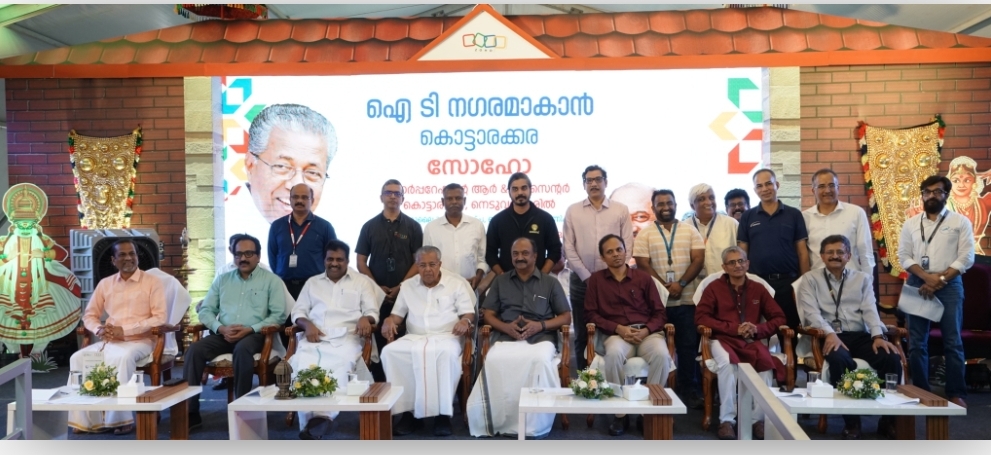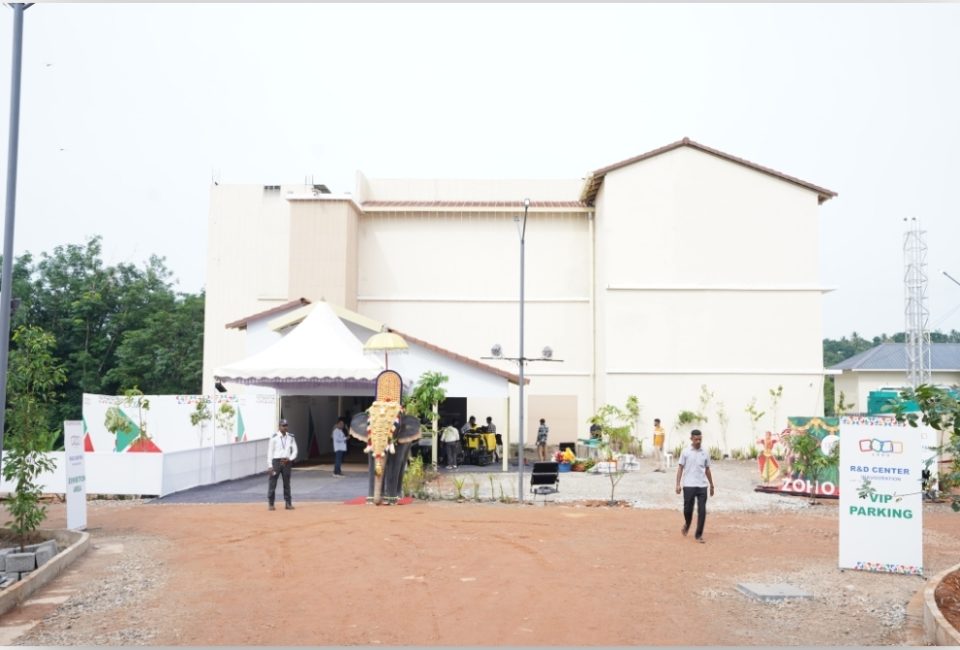Picture this: a bustling tech campus nestled in rural Kerala. Instead of Bangalore or Hyderabad, talented engineers code in Kottarakkara. Moreover, they’re building India’s future in AI and robotics.
This vision becomes reality as Zoho Corp. expands its R&D footprint. Recently, the company inaugurated its new campus in Kottarakkara, Kerala. Additionally, they acquired Asimov Robotics and partnered with Kerala Startup Mission. Furthermore, these moves signal a revolutionary approach to rural development through technology.
Why Rural Tech Hubs Matter More Than Ever
First, let’s address the obvious question. Why choose a small town over established tech corridors? Subsequently, the answer reveals Zoho’s unique philosophy about distributed innovation.
Traditional tech companies concentrate operations in major cities. Consequently, this approach creates urban overcrowding and rural brain drain. However, Zoho challenges this conventional wisdom. Instead, they prove that deep-tech innovation thrives anywhere with proper infrastructure and talent development.
Moreover, rural locations offer distinct advantages. Initially, operational costs remain significantly lower. Additionally, employee retention improves when people work closer to home. Furthermore, companies can tap into previously overlooked talent pools.
The Human Impact: Leadership Voices on Transformation
K. N. Balagopal, Kerala’s Finance Minister, emphasizes the strategic importance. “This collaboration with Zoho would be a significant step in strengthening Kerala’s local ecosystems,” he states. Moreover, he highlights intellectual property creation and product development from rural areas. Additionally, he positions the Kottarakkara campus as a pilot model for transformative approaches.
Shailesh Davey, CEO and Co-founder of Zoho Corp., outlines their technical focus. “Our Kottarakkara office will be dedicated to enhancing our R&D projects in various fields starting with AI and Robotics,” he explains. Furthermore, he emphasizes collaboration with like-minded deep-tech organizations. Additionally, he stresses their goal of making India self-reliant in critical technology.
Anoop P. Ambika, CEO of Kerala Startup Mission, validates the strategic positioning. “Zoho’s entry into the state further validates our argument that the state’s startup ecosystem is an excellent enabler,” he notes. Moreover, he celebrates their partnership in establishing a Deep Tech Product Studio. Consequently, this collaboration demonstrates effective public-private synergy.
Strategic Acquisitions and Partnerships: Building the Ecosystem
The Asimov Robotics acquisition represents more than simple expansion. Founded in 2012, Asimov specializes in robotic solutions for hazardous and repetitive scenarios. Therefore, this acquisition directly enhances Zoho’s robotics capabilities. Moreover, it demonstrates their commitment to comprehensive deep-tech development.
Simultaneously, the Kerala Startup Mission partnership creates broader ecosystem benefits. KSUM opens a Deep Tech Product Studio to unite startups and organizations. Additionally, Zoho becomes the first industry partner for this initiative. Furthermore, they will provide mentorship, explore collaborations, and strengthen the overall ecosystem.
The R&D associations extend this collaborative approach further. Zoho partners with Boson Motors, Vipus Advanced Materials, vTitan, and Zentron Labs. Moreover, they collaborate with Verdant Telemetry & Antenna Systems, Netrasemi, and Genrobotics. Additionally, partnerships with Energy 24by7 and IIT Bombay round out their network. Consequently, these associations promote knowledge sharing across diverse technological domains.
Innovation Through Talent Development: The Kottarakkara Model
The campus implementation strategy demonstrates sophisticated workforce development thinking. Initially, the facility accommodates 250 employees. However, Zoho’s approach focuses on local talent cultivation rather than external recruitment.
Their internship program exemplifies this philosophy. First, trainees undergo three months of skill development. Subsequently, they choose specialization areas while mastering mandatory coding skills. Moreover, C, C++, and Python become foundational requirements across all disciplines.
After skill development, trainees work on diverse projects for six months. Additionally, evaluation focuses on problem-solving abilities and initiative demonstration. Furthermore, successful candidates join Zoho’s permanent workforce. Throughout nine months of training, interns receive stipends. Consequently, 40 employees have already joined through this program.
Market Analysis: Rural Tech Hubs as Competitive Advantage
From a strategic perspective, Zoho’s rural expansion addresses several market dynamics. First, urban tech talent markets experience increasing saturation and cost inflation. Second, remote work normalization reduces location dependency for knowledge work. Third, government initiatives increasingly support rural technology development.
The competitive landscape analysis reveals interesting patterns. Traditional technology companies concentrate in established hubs. Conversely, this concentration creates vulnerability to local disruptions and talent shortages. However, distributed operations provide resilience and flexibility benefits.
Furthermore, rural locations offer unique advantages for certain technology domains. AI and robotics research benefits from dedicated facilities without urban distractions. Moreover, lower operational costs enable more experimental approaches. Additionally, closer community relationships foster long-term stability.
Economic Impact: Multiplier Effects of Technology Investment
The economic implications extend beyond immediate job creation. Technology companies generate significant multiplier effects in local economies. Initially, direct employment provides stable, high-paying jobs. Subsequently, indirect employment emerges through supporting services and infrastructure.
Moreover, technology presence attracts additional investments and talent. Educational institutions upgrade programs to meet industry demands. Additionally, local entrepreneurs identify opportunities in the expanding ecosystem. Furthermore, property values and local business revenues increase correspondingly.
The skill development programs create particularly valuable long-term benefits. Trained individuals either join Zoho or contribute to other technology ventures. Moreover, their expertise enriches the local talent pool. Additionally, successful graduates often become mentors for subsequent cohorts.
Technology Focus Areas: AI and Robotics Leadership
Zoho’s concentration on AI and robotics reflects strategic market positioning. These domains represent critical future technologies with enormous growth potential. Moreover, India seeks self-reliance in these areas for national security and economic competitiveness.
The robotics focus particularly aligns with manufacturing and service automation trends. Asimov Robotics’ expertise in hazardous scenario solutions addresses real industrial needs. Furthermore, their experience provides practical foundation for expanded research efforts.
AI development capabilities complement existing software expertise. Zoho’s extensive business application portfolio benefits from AI enhancement. Additionally, AI research supports their goal of creating more intelligent, automated solutions.
Policy Implications: Models for Nationwide Replication
The Kottarakkara initiative demonstrates effective policy coordination across multiple levels. State government support provides regulatory facilitation and infrastructure development. Moreover, local community engagement ensures social acceptance and talent availability.
The public-private partnership model offers replication potential for other regions. Government agencies provide policy framework and initial infrastructure. Meanwhile, private companies contribute technology expertise and market connectivity. Additionally, educational institutions bridge skill gaps and research capabilities.
This collaborative approach addresses traditional rural development challenges. Instead of extractive industries or basic manufacturing, technology development creates sustainable, high-value employment. Moreover, intellectual property creation provides long-term economic benefits. Furthermore, global connectivity enables rural communities to participate in international markets.
Future Implications: Distributed Innovation Networks
Looking ahead, Zoho’s rural expansion model may influence broader industry patterns. Other technology companies might recognize similar advantages in distributed operations. Moreover, government policies could increasingly support rural technology development.
The success metrics will likely influence policy decisions and investment patterns. Employment creation, skill development outcomes, and innovation output provide quantifiable measures. Additionally, community impact assessments reveal social transformation effects.
International competitiveness considerations also drive this approach. Countries with distributed innovation capabilities demonstrate greater resilience and adaptability. Moreover, rural technology development reduces urban pressure while maximizing human capital utilization.

Conclusion: Pioneering Rural Technology Renaissance
Zoho’s Kerala expansion represents more than corporate growth strategy. It demonstrates technology’s potential to transform rural communities while maintaining global competitiveness. Moreover, it challenges assumptions about optimal innovation environments.
The combination of strategic acquisitions, partnership development, and talent cultivation creates comprehensive ecosystem development. Furthermore, the focus on AI and robotics positions India for future technology leadership. Additionally, the replicable model offers hope for balanced regional development.
Success in Kottarakkara could inspire similar initiatives across India and beyond. Rural communities worldwide possess untapped potential for technology innovation. Moreover, distributed development models provide resilience benefits in an uncertain global environment.
The future of technology development may indeed be rural. Zoho’s bold experiment in Kerala provides the roadmap for this transformation.

